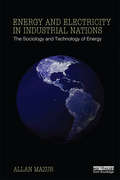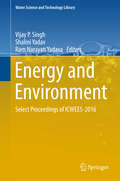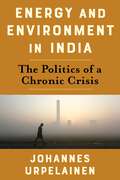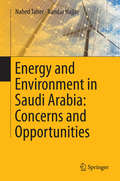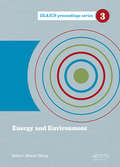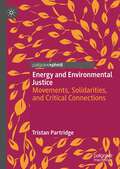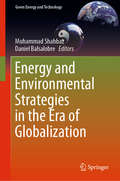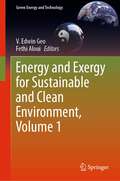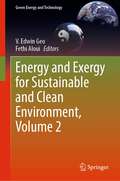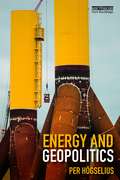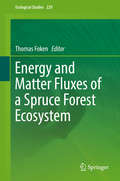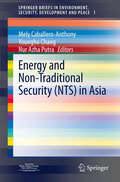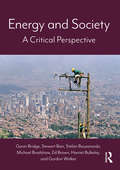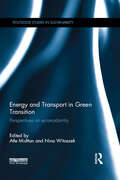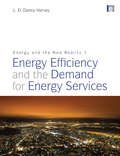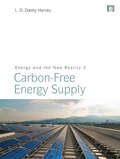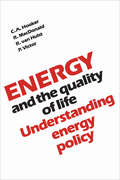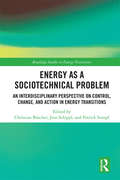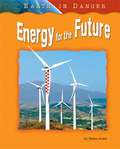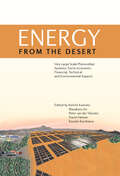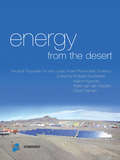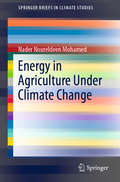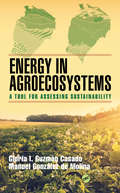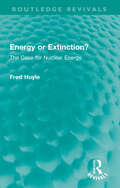- Table View
- List View
Energy and Electricity in Industrial Nations: The Sociology and Technology of Energy
by Allan MazurEnergy is at the top of the list of environmental problems facing industrial society, and is arguably the one that has been handled least successfully, in part because politicians and the public do not understand the physical technologies, while the engineers and industrialists do not understand the societal forces in which they operate. In this book, Allan Mazur, an engineer and a sociologist, explains energy technologies for nontechnical readers and analyses the sociology of energy. The book gives an overview of energy policy in industrialised countries including analysis of climate change, the development of electricity, forms of renewable energy and public perception of the issues. Energy is a key component to environment policy and to the workings of industrial society. This novel approach to energy technology and policy makes the book an invaluable inter-disciplinary resource for students across a range of subjects, from environmental and engineering policy, to energy technology, public administration, and environmental sociology and economics.
Energy and Environment
by Vijay P Singh Shalini Yadav Ram Narayan YadavaThis book comprising seven parts is organized under two sections. The first section deals with environment containing four parts, whereas the second section, containing three parts, is on energy. The first part deals with some aspects of hydrologic impacts of global warming and anthropogenic changes. Part II is on bio-environment and discusses plants, biomass, and bacterial species. Part III focuses on chemical environment. Section one is concluded with Part IV on social environment. Section two starts out with Part V on solar energy. Hydropower is discussed in Part VI. The concluding Part VII deals with biogas. The book will be of interest to researchers and practitioners in the field of water resources, hydrology, environmental resources, agricultural engineering, watershed management, earth sciences, as well as those engaged in natural resources planning and management. Graduate students and those wishing to conduct further research in water and environment and their development and management may find the book to be of value.
Energy and Environment in India: The Politics of a Chronic Crisis (Center on Global Energy Policy Series)
by Johannes UrpelainenIndia is driving some of the most important trends in global energy markets—with vast environmental implications. As the country grows wealthier, Indians are buying more cars, air conditioners, plane tickets, and other goods that increase demand for fossil fuels. At the same time, the country still faces widespread poverty, and it struggles to address persistent environmental and energy-sector problems, from frequent power outages to a significant number of deaths linked to air pollution.Johannes Urpelainen provides an expert guide to India’s energy and environmental issues that incorporates both domestic and global perspectives. He details how unequal economic development and rapid population growth have brought the country to its current state: a potential engine of the world economy hampered by environmental hazards and energy poverty. Urpelainen argues that institutional shortcomings have led wealthier Indians to find private solutions that protect them from threats such as air pollution and heat waves, but exclude the poor. The retreat of the rich limits the state’s ability to regulate the energy sector or address environmental degradation. Urpelainen examines India’s most severe environmental crises, considering how climate disruptions are affecting the country’s present and future. He analyzes India’s role in global environmental politics and assesses the prospects of achieving a more sustainable society. Useful and accessible, this book also offers pragmatic solutions to help overcome the constraints on effective energy and environmental policy.
Energy and Environment in Saudi Arabia: Concerns & Opportunities
by Nahed Taher Bandar HajjarThe vast oil resources in Saudi Arabia have for decades encouraged a generous system of oil subsidies, making the Kingdom one of the leading countries in the world with the cheapest domestic price of oil. Such subsidies have, however, encouraged inefficient utilization of oil, which is largely consumed in the power, water and transportation sectors, contributing substantially to CO2 emission in the country. These problems are exacerbated by demographic dynamics, urbanization, changes in income and consumption patterns, and industrialization. On current trends of domestic consumption patterns, Saudi Arabia will consume the whole of the oil it will produce by 2030, which will reflect negatively on the financial capacity of the government to execute its development programs. It is this revenue constraining concern, rather than ecological challenges, that has started to attract policy attention in Saudi Arabia. This book gives a unique perspective on these challenges by looking at them as investment opportunities, not financial constraints on the government budget. It sets out to examine the nature and extent of the energy and environmental challenges facing Saudi Arabia, and to explore various options for turning these challenges into profitable investment opportunities that could create jobs, boost income, develop capability in clean energy technology and promote environmental sustainability.
Energy and Environment: Proceedings of the 2014 International Conference on Energy and Environment (ICEE 2014), June 26-27, Beijing, China (IRAICS Proceedings)
by Dawei ZhengThe 2014 International Conference on Energy and Environment (ICEE 2014) was held June 26-27 in Beijing, China. The objective of ICEE 2014 was to provide a platform for researchers, engineers, academics as well as industry professionals from all over the world to present their research results and development activities in Energy and Environment res
Energy and Environmental Justice: Movements, Solidarities, and Critical Connections
by Tristan PartridgeThis book reconnects energy research with the radical, reflexive, and transformative approaches of Environmental Justice. Global patterns of energy production and use are disrupting the ecosystems that sustain all life, disproportionately affecting marginalized groups. Addressing such injustices, this book examines how energy relates to structural issues of exploitation, racism, colonialism, extractivism, the commodification of work, and the systemic devaluing of diverse ‘others.’ The result is a new agenda for critical energy research that builds on a growing global movement of environmental justice activism and scholarship. Throughout the book the author reframes ‘transitions’ as collaborative projects of justice that demand structural change and societal shifts to more equitable and reciprocal ways of living. This book will be an invaluable resource for students, scholars, and practitioners interested in transforming energy systems and working collectively to build just planetary futures.
Energy and Environmental Strategies in the Era of Globalization (Green Energy and Technology)
by Muhammad Shahbaz Daniel BalsalobreThis book provides readers with cutting-edge techniques that can be applied to energy and environmental economics. Further, it highlights the effects that both globalization and economic growth have on the environment. In addition to offering a broader perspective on the relationship between environmental pollution, energy consumption and economic growth, the book studies the relationship between economic growth and environmental damage by drawing on the theoretical hypothesis of the Environmental Kuznets Curve. The book presents new econometric techniques and innovative approaches to the study of the energy economy. Accordingly, it can be used to help analyse the current state of the energy economy, the environment and globalization, and can serve as a theoretical reference manual for doctoral students and academics seeking new analytical techniques.
Energy and Exergy for Sustainable and Clean Environment, Volume 1 (Green Energy and Technology)
by Fethi Aloui V. Edwin GeoThis multi-disciplinary book presents the most recent advances in exergy, energy, and environmental issues. Volume 1 focuses on fundamentals in the field and covers current problems, future needs, and prospects in the area of energy and environment from researchers worldwide. Based on some selected lectures from the Eleventh International Exergy, Energy and Environmental Symposium (IEEES-11) and complemented by further invited contributions, this comprehensive set of contributions promote the exchange of new ideas and techniques in energy conversion and conservation in order to exchange best practices in "energetic efficiency." Included are fundamental and historical coverage of the green transportation and sustainable mobility sectors, especially regarding the development of sustainable technologies for thermal comforts and green transportation vehicles. Furthermore, contributions on renewable and sustainable energy sources, strategies for energy production, and the carbon-free society constitute an important part of this book.
Energy and Exergy for Sustainable and Clean Environment, Volume 2 (Green Energy and Technology)
by Fethi Aloui V. Edwin GeoThis multi-disciplinary book presents the most recent advances in exergy, energy, and environmental issues. Volume 2 focuses on fundamentals in the field and covers current problems, future needs, and prospects in the area of energy and environment from researchers worldwide. Based on some selected lectures from the Eleventh International Exergy, Energy and Environmental Symposium (IEEES-11) and complemented by further invited contributions, this comprehensive set of contributions promote the exchange of new ideas and techniques in energy conversion and conservation in order to exchange best practices in "energetic efficiency." Included are fundamental and historical coverage of the green transportation and sustainable mobility sectors, especially regarding the development of sustainable technologies for thermal comforts and green transportation vehicles. Furthermore, contributions on renewable and sustainable energy sources, strategies for energy production, and the carbon-free society constitute an important part of this book.
Energy and Geopolitics
by Per HögseliusThe idea that energy shapes and is shaped by geopolitics is firmly rooted in the popular imagination – and not without reason. Very few countries have the means to secure their energy needs through locally available supplies; instead, enduring dependencies upon other countries have developed. Given energy’s strategic significance, supply systems for fuels and electricity are now seamlessly interwoven with foreign policy and global politics. Energy and Geopolitics enables students to enhance their understanding and sharpen their analytical skills with respect to the complex relations between energy supply, energy markets and international politics. Per Högselius guides us through the complexities of world energy and international energy relations, examining a wide spectrum of fossil fuels, alongside nuclear and renewable energies. Uniquely, the book also shows how the geopolitics of energy is not merely a matter for the great powers and reveals how actors in the world’s smaller nations are as active in their quest for power and control. Encouraging students to apply a number of central concepts and theoretical ideas to different energy sources within a multitude of geographical, political and historical contexts, this book will be a vital resource to students and scholars of geopolitics, energy security and international environmental policy and politics.
Energy and Matter Fluxes of a Spruce Forest Ecosystem
by Thomas FokenThis book focuses on fluxes of energy, carbon dioxide and matter in and above a Central European spruce forest. The transition from a forest affected by acid rain into a heterogeneous forest occurred as a result of wind throw, bark beetles and climate change. Scientific results obtained over the last 20 years at the FLUXNET site DE-Bay (Waldstein-Weidenbrunnen) are shown together with methods developed at the site, including the application of footprint models for data-quality analysis, the coupling between the trunk space and the atmosphere, the importance of the Damk#65533;hler number for trace gas studies, and the turbulent conditions at a forest edge. In addition to the many experimental studies, the book also applies model studies such as higher-order closure models, Large-Eddy Simulations, and runoff models for the catchment and compares them with the experimental data. Moreover, by highlighting processes in the atmosphere it offers insights into the functioning of the ecosystem as a whole. It is of interest to ecologists, micrometeorologists and ecosystem modelers.
Energy and Non-Traditional Security (NTS) in Asia
by Mely Caballero-Anthony Youngho Chang Nur Azha PutraTraditional notions of security are premised on the primacy of state security. In relation to energy security, traditional policy thinking has focused on ensuring supply without much emphasis on socioeconomic and environmental impacts. Non-traditional security (NTS) scholars argue that threats to human security have become increasingly prominent since the end of the Cold War, and that it is thus critical to adopt a holistic and multidisciplinary approach in addressing rising energy needs. This volume represents the perspectives of scholars from across Asia, looking at diverse aspects of energy security through a non-traditional security lens. The issues covered include environmental and socioeconomic impacts, the role of the market, the role of civil society, energy sustainability and policy trends in the ASEAN region.
Energy and Society: A Critical Perspective
by Harriet Bulkeley Gavin Bridge Gordon Walker Michael Bradshaw Stefan Bouzarovski Stewart Barr Ed BrownEnergy and Society is the first major text to provide an extensive critical treatment of energy issues informed by recent research on energy in the social sciences. Written in an engaging and accessible style it draws new thinking on uneven development, consumption, vulnerability and transition together to illustrate the social significance of energy systems in the global North and South. The book features case studies, examples, discussion questions, activities, recommended reading and more, to facilitate its use in teaching. Energy and Society deploys contemporary geographical concepts and approaches but is not narrowly disciplinary. Its critical perspective highlights connections between energy and significant socio-economic and political processes, such as globalisation, urban isation, international development and social justice, and connects important issues that are often treated in isolation, such as resource availability, energy security, energy access and low-carbon transition. Co-authored by leading researchers and based on current research and thinking in the social sciences, Energy and Society presents a distinctive geographical approach to contemporary energy issues. It is an essential resource for upperlevel undergraduates and Master’s students in geography, environmental studies, urban studies, energy studies and related fields.
Energy and Transport in Green Transition: Perspectives on Ecomodernity (Routledge Studies in Sustainability)
by Nina Witoszek Atle MidttunThis book breaks new ground in the studies of green transition. It frames the ongoing transformation in terms of a "battle of modernities" with the emerging vision of ecomodernity as the final destination. It also offers a systematic exploration of the potential for extensive transformation of carbon-intensive sectors – with a focus on energy and transport – towards a low or post-carbon economy. The book does so in a comparative perspective, by pointing to a diversity of techno-economic and institutional solutions in the mature Western economies, and in the rapidly growing East and developing South. The contributors highlight a broad spectrum of available alternatives as well as illuminate conflicting interests involved. They also demonstrate how solutions to the climate challenge require parallel technological and governance innovation. The book advocates a new, overarching vision and agenda of ecomodernity – based on a synergistic paradigm-shift in industry, politics and culture – to trigger and sustain the ecological innovation necessary to tip development in a green direction. This vision cannot be monolithic; rather, it should reflect the diverse interests and conditions of the global population. This book is aimed at researchers and postgraduate students of energy, transport, environmental and climate policies, as well as development, environment, innovation and sustainability.
Energy and the New Reality 1: Energy Efficiency and the Demand for Energy Services
by Danny HarveyReducing and managing humanity's demand for energy is a fundamental part of the effort to mitigate climate change. In this, the most comprehensive textbook ever written on the subject, L.D. Danny Harvey lays out the theory and practice of how things must change if we are to meet our energy needs sustainably. The book begins with a succinct summary of the scientific basis for concern over global warming, then outlines energy basics and current patterns and trends in energy use. This is followed by a discussion of current and advanced technologies for the generation of electricity from fossil fuels. The book then considers in detail how energy is used, and how this use can be dramatically reduced, in the following end-use sectors: - buildings - transportation - industry - food and agriculture - municipal services The findings from these sector-by-sector assessments are then applied to generate scenarios of how global energy demand could evolve over the coming decades with full implementation of the identified and economically-feasible energy-saving potential. The book ends with a brief discussion of policies that can be used to reduce energy demand, but also addresses the limits of technologically-based improvements in efficiency in moderating demand and of the need to re-think some of our underlying assumptions concern ends with a brief discusing what we really need. Along with its companion volume on C-free energy supply, and accompanied by extensive supplementary online material, this is an essential resource for students and practitioners in engineering, architecture, environment and energy related fields. Online material includes: Excel-based computational exercises, teaching slides for each chapter, links to free software tools.
Energy and the New Reality 2: Carbon-free Energy Supply
by L. D. HarveyTransforming our energy supplies to be more sustainable is seen by many to be the biggest challenge of our times. In this comprehensive textbook, L. D. Danny Harvey sets out in unprecedented detail the path we must take to minimize the effects that the way we harness energy will have on future climate change. The book opens by highlighting the importance of moving to low carbon technologies for generation, then moves on to explain the functioning, potential and social/environmental issues around: solar energy wind energy biomass energy geothermal energy hydroelectric power ocean energy nuclear energy. It also covers the options for carbon capture and storage and the contexts in which low carbon energy can best be utilized (potential for community integrated systems, and the hydrogen economy). The book closes with scenarios that combine the findings from its companion volume (concerning the potential for limiting future energy demand) with the findings from this volume (concerning the cost and potential of C-free energy systems) to generate scenarios that succeed in limiting future atmospheric CO2 concentration to no more than 450 ppmv. Detailed yet accessible, meticulously researched and reviewed, this work constitutes an indispensible textbook and reference for students and practitioners in sustainable energy and engineering.
Energy and the Quality of Life: Understanding Energy Policy
by Clifford Hooker Robert Macdonald Robert Van Hulst Peter VictorAs the supply/cost crunch tightens, issues related to energy become increasingly compelling. This is a guide for the general public to the fossil fuel crisis facing Canada, and Ontario in particular. It is also about other long-term matters of greater importance: the economic, socio-political, and cultural consequences of the choices which now have to be made, primarily by governments. The authors argue that energy policy is social policy. Therefore our ideas about the kind of society we want must be a governing consideration in working out a policy to take Canada through the energy crisis. The four writers bring to bear on the problem the perspectives of engineering, philosophy, environmental studies, and economics. The result is a balanced guide for the continuing debate on the adaptation of society to the imperatives of energy.
Energy as a Sociotechnical Problem: An Interdisciplinary Perspective on Control, Change, and Action in Energy Transitions (Routledge Studies in Energy Transitions)
by Christian Büscher Patrick Sumpf Jens SchipplEnergy as a Sociotechnical Problem offers an innovative approach to equip interdisciplinary research on sociotechnical transitions with coherence and focus. The book emphasizes sociotechnical problems in three analytical dimensions: - In the control dimension, contributing authors examine how control can be maintained despite increasing complexity and uncertainty, e.g., in power grid operations or on energy markets; - In the change dimension, the authors explore if and how change is possible despite the need for stable orientation, e.g., regarding discourses, real-world labs and learning; - Finally, in the action dimension, the authors analyze how the ability to act on a permanent basis is sustained despite opaqueness and ignorance, exemplified by the work on trust, capabilities or individual motives. Drawing on contributions from engineering, economics, philosophy, political science, psychology and sociology, the book assembles a range of classic and current themes including innovation, resilience, institutional economics, design or education. Energy as a Sociotechnical Problem presents the ongoing transformation of the energy complex as a multidimensional process, in which the analytical dimensions interact with each other in shaping the energy future. As such, this book will be of great interest to students and scholars of energy transitions, energy science and environmental social science more generally, as well as to practitioners working within the field of energy policy.
Energy for the Future (Earth in Danger)
by Helen OrmeBurning fossil fuels, such as oil and coal, may be accelerating Earth's climate change. How can we develop clean, renewable sources of energy and reduce our dependence on fossil fuels? Energy for the Future clearly presents the pros and cons of alternative energy sources-- from wind, water, and solar power to bio-fuels, hydrogen fuel cells, and nuclear power. A section in the back of the book will inspire young environmentalists by suggesting ways they can help protect their planet.
Energy from the Desert: Feasibility of Very Large Scale Photvoltaic Power Generation Systems & Practical Proposals for Very Large Scale Photovoltaic Systems
by Keiichi Komoto David Faiman Masakazu Ito Peter van der Vleuten Kosuke KurokawaThe world's deserts are sufficiently large that, in theory, covering a fraction of their landmass with PV systems could generate many times the current primary global energy supply. The Energy from the Desert two-volume set details the background and concept of Very Large Scale Photovoltaics (VLS-PC) and examines and evaluates their potential as viable power generation systems. The authors present case studies of both virtual and real projects based on selected regions (including the Mediterranean, Sahara, Chinese Gobi, Mongolian Gobi, Indian Thar, Australian Desert and the US) and their specific socio-economic dynamics, and argue that VLS-PV systems in desert areas will be readily achievable in the near future.
Energy from the Desert: Practical Proposals for Very Large Scale Photovoltaic Systems
by Keiichi Komoto David Faiman Peter van der Vleuten Kosuke KurokawaThe world's deserts are sufficiently large that, in theory, covering a fraction of their landmass with PV systems could generate many times the current primary global energy supply. In three parts, this study details the background and concept of VLS-PV, maps out a development path towards the realization of VLS-PV systems and provides firm recommendations to achieve long-term targets. This represents the first study to provide a concrete set of answers to the questions that must be addressed in order to secure and exploit the potential for VLS-PV technology and its global benefits.
Energy in Agriculture Under Climate Change (SpringerBriefs in Climate Studies)
by Nader Noureldeen MohamedThis book discusses the role of energy in agriculture which reaches 30%, and the role of agriculture in energy where the water shred by 17% in total electricity generation in addition to the role of bioenergy as a source of liquid energy. Climate change and global heating will increase the temperature and that will affect plant growth, water availability and the share of electricity in agriculture and other energy phases in agriculture. Global heating means more water pumping, more uses of fertilizers and pesticides in which intensive power consumption in addition to need of more electricity for air-condition inside the greenhouses, the manufacturing of hormone and plant growth organizers will also consume more energy. Finally, the book explains why the water, energy and food become one nexus and the interaction and interference between them.This book will have valuable information for both students and faculties of engineering and agriculture in addition to research centers, water institutions and climate change specialists.
Energy in Agroecosystems: A Tool for Assessing Sustainability (Advances in Agroecology)
by Gloria I. Casado Manuel Gonzalez de MolinaEnergy in Agroecosystems: A Tool for Assessing Sustainability is the first book on energy analysis that is up-to-date and specifically dedicated to agriculture. It is written from an agroecological perspective and goes beyond the conventional analysis of the efficient use of energy. The book provide a methodological guide to assess energy efficiency and sustainability from an eco-energetic point of view. <P><P> Case studies from both Europe and America, which are representative of today’s most used scales of analysis (crop, farm, local or national) and the different farm management practices (traditional, industrialized, and contemporary organic), apply this methodology This book will be of primary interest to researchers, practitioners, and students working in the areas of agroecology, sustainable agriculture, environmental science, energy analysis, natural resources management, rural development and international development.
Energy or Extinction?: The Case for Nuclear Energy (Routledge Revivals)
by Fred HoyleOriginally published in 1977 and as second edition in 1979, this book argues that without energy sources on a vast scale our present society cannot survive. According to the author, Fred Hoyle, the technology to tap solar, wind or wave power on a large enough scale just does not exist. He considers nuclear fission to be the only source currently capable of supplying our needs. The author fills in the scientific background necessary to appreciate his arguments in his lucid, direct style, so that the book can act as an ideal introduction for those unfamiliar with the energy debate. This short book is unashamedly provocative and many of the central tenets of it remain as relevant today as when it was first published.
